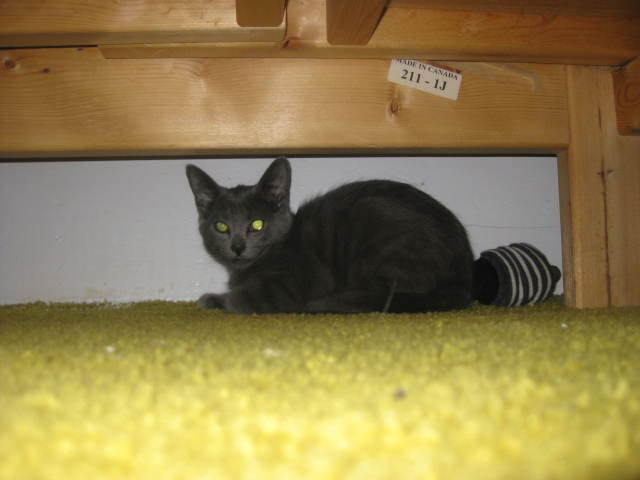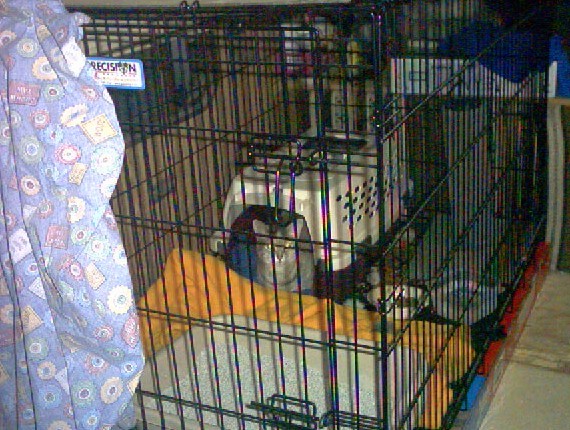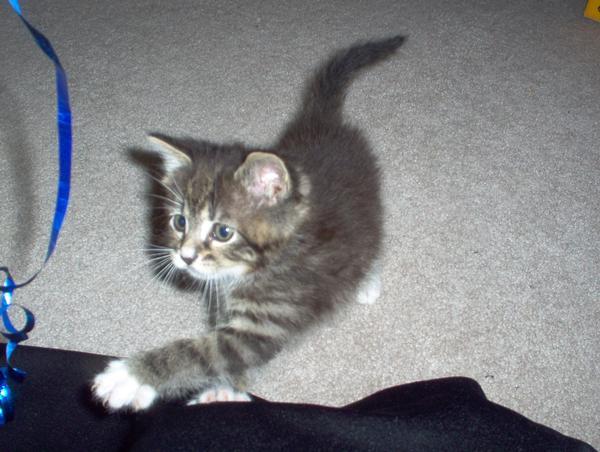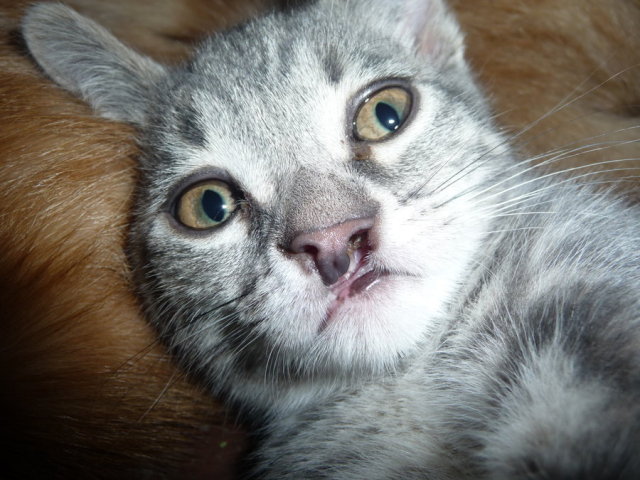QuestionI have 2 cats, a 3 year old female (all white with blue eyes) cat named Co-Co and a 5 month old male kitten (white with gray striped patches) named Juno.
Juno is aggressive and loves to play, bite, attack his own tale and eat. He has always snored, which is cute but I fear might be a symptom right now. He is having muscle spasms that are not designated to one part of his body. His whole body almost shakes with these muscle spasms and they are scaring the crap out of me. I have muscle spasms too and I know they can not only be annoying but painful. He doesn't act like he is in pain, doesn't avoid being pet or touched, but does love to play and bite - and cuddle sometimes.
Juno also started only going pee and poop in the bathtub. I'm not sure if it's because Co-Co tries to dominate the home (she was here first# and doesn't want him to use the litter box, or if he just prefers to use the tub, but he always goes in tub. He likes to drink out of the toilet too, just like the dog. I always make sure they have a clean litter box #oldest cat takes the litter out and rolls in it everytime I put new litter in it) and fresh bowls of food and water. Could all of this be connected? Maybe he went pee in the tub and tried to drink the fresh water falling from the tap and it got contaminated or could he just have something else wrong that I can not figure out. What on earth should I do?
Juno doesn't stop biting/playing hardly ever, only goes to pee and poo in the tub, and is having muscle spasms that are rather visible - but seem to only be when he is still, not when he is walking around.
Any ideas? Because of this economy I can't afford a vet visit until my taxes come in sometime toward the end of next month so I am wondering if there is anything that I can do at home or if I have nothing to worry about. I have muscle spasms and the dr's say it's normal and just take a relaxer, could it be the same for him??
AnswerHi Diane,
I have a few concerns. First, are you *sure* that it is muscle spasms and can't possibly be a seizure? Seizures/convulsions can be from a variety of causes, some serious, some less. This is important because some of these causes are from contagious diseases, therefore it would be vitally important that you separate your two cats until you figure out definitely what's wrong.
I can tell you about several possibilities, but ultimately I would say he definitely needs to see a vet to rule out certain causes. I understand all about not having the money when you need it most, believe me. There are two things you can do here; call your local shelter who can advise you local low-cost clinics, as well as Banfield (the pet clinic in Petsmarts) has clinic hours two days a week in which you don't have to pay an exam fee. It's first come, first serve, but all you have to pay for is any vaccinations given, tests run, medications, etc. That's great considering exams can run from $35 up to $75.
My particular concern is FIP, Feline Infectious Peritonitis. It is most prevalent in kittens because of their weakened immune systems. The symptoms present in two different forms, but in the dry form paralysis, disorientation, tremors, convulsions, and behavior changes. It is transmitted through saliva and feces, therefore very important that you separate your two. I would keep Juno isolated in a large bathroom with his bowls, litter box, toys etc. Please don't feel that this is cruel, as it is for their safety and wellbeing, and they feel more secure in smaller areas anyway. Please read the following article for more information:
http://www.peteducation.com/article.cfm?c=1+1316&aid=212
But more importantly, please don't panic. There are a slew of possibilities, and the point in going to the vet is to rule out these diseases. FIP and FIV are harder to diagnose, but there is testing that they can do, which the article outlines beautifully. Also, his history i.e. where you got him from and at what age will tell you a lot, because his own potential exposure to the disease or other factors will tell a lot as well.
Just for future reference, as far as your resident cat guarding the litter box, this is behavior should not be tolerated. Not only should you monitor them and correct your resident cat for any guarding behavior, but you should have one litter box per cat, and probably in a different location. This also helps ensure both can use the litter box, as the last thing you want is improper elimination.
Good luck with everything, and please let me know if you have any more questions!
Best regards,
Holly Martin

 Shaking? Or is it from her purr?
Question
Prada Under our bed
We just adopted a Himalaya
Shaking? Or is it from her purr?
Question
Prada Under our bed
We just adopted a Himalaya
 vacation house and taking cat
Questionour permanent home is on a 3 acre semi wooded p
vacation house and taking cat
Questionour permanent home is on a 3 acre semi wooded p
 runts
Question
stubby(my cat)
Can the mother chew off
runts
Question
stubby(my cat)
Can the mother chew off
 Cleft Lip
Question
Cleft Lip Kitty
Hi Ali,
I have a cat thats 11
Cleft Lip
Question
Cleft Lip Kitty
Hi Ali,
I have a cat thats 11
 Identify Cat Breed?
Question
picture of my cat picture of my cat &nbs
Identify Cat Breed?
Question
picture of my cat picture of my cat &nbs